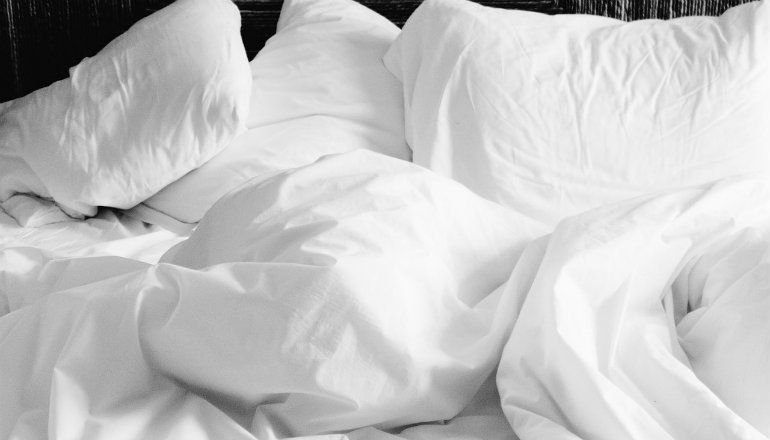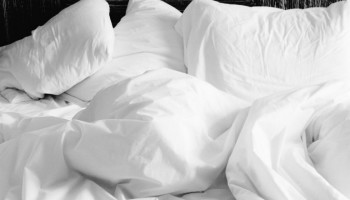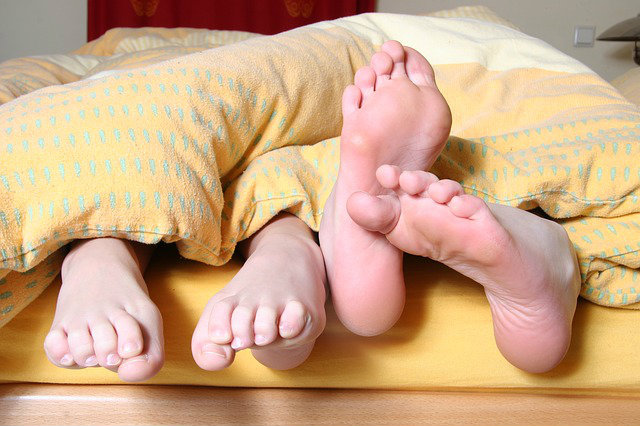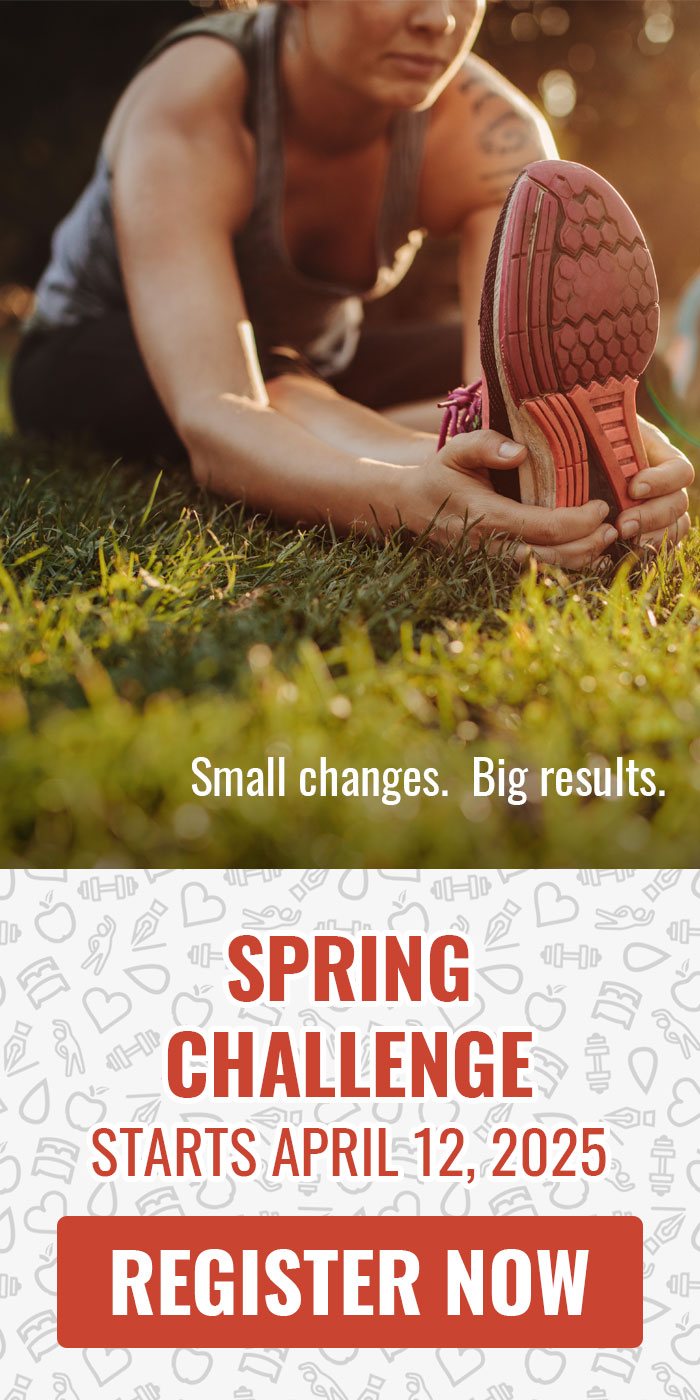 Reading Time: 6 minutes
Reading Time: 6 minutesLet’s talk about your bed. How many of you love your bed? And, for the purposes of this article, I’m not asking you if you love to sleep or get close to the one you adore. I’m talking about your bed itself.
The reason I ask is if you don’t love your bed, you have a fairly large problem, one you might not fully understand you have. Sleep is incredibly important to everyone’s health and if you are someone who exercises regularly, even more so.
I love to sleep. Looooove to sleep. Maybe it’s because I work seventy hours a week. Perhaps it’s because I have three children all under the age of eight. Maybe it’s because my fitness, particularly weight training is a priority for me. For whatever reason, sleeping is one of my greatest pleasures. When I got my first significant paying job, the first purchase I made was a very pricey memory foam mattress that I still have today. I love it. It’s old now, probably over ten years, but I still love it. I spent my entire college career sleeping on a couch, so I know the value of a cozy comfortable bed.
Your Lack of Sleep Is Killing You
In one of the most sobering TEDx talks I have ever watched, Dr. Kirk Parsley gave a compelling discussion on the value of sleep:
He does a wonderful job framing how America as a nation is sleep deprived, yet nearly all of us don’t realize it. Because of our hard-charging, succeed at all costs, get it done no matter what attitudes toward our professions, families, and education, we have created a society that is comfortable with something that will eventually kill us.
Sleep Guidelines for All of Us
Taking a look at the most basic understandings of sleep science, and based on their two-year study, the National Sleep Foundation put together standardized recommendations for a given age range:
- Newborns (0-3 months): Sleep range narrowed to 14-17 hours each day (previously 12-18)
- Infants (4-11 months): Sleep range widened two hours to 12-15 hours (previously 14-15)
- Toddlers (1-2 years): Sleep range widened by one hour to 11-14 hours (previously 12-14)
- Preschoolers (3-5): Sleep range widened by one hour to 10-13 hours (previously 11-13)
- School age children (6-13): Sleep range widened by one hour to 9-11 hours (previously 10-11)
- Teenagers (14-17): Sleep range widened by one hour to 8-10 hours (previously 8.5-9.5)
- Younger adults (18-25): Sleep range is 7-9 hours (new age category)
- Adults (26-64): Sleep range did not change and remains 7-9 hours
- Older adults (65+): Sleep range is 7-8 hours (new age category)
During this sleep, we move in and out of stages of sleep that are very specific. The smart guys at Harvard Medical School have identified that 20-25% of the time spent sleeping is REM time in healthy adults. This rapid eye movement time is where all of the cool dreaming happens. When we are not in REM sleep, we end up in the more deep restorative sleep where all of the true recovery happens. We typically cycle four to six times in approximately ninety-minute blocks throughout a full night’s sleep.
Sleep for Athletes and Hard-Training Individuals
We all know that appropriate rest is essential for development and growth in humans, but have you considered the needs for a highly active person? If you are like me and you spend a lot of time tearing yourself down in the gym, sleep becomes increasingly more important. Concerns of overtraining and incomplete recovery between exercise bouts are real.
In an article called You Don’t Need More Training, You Need More Recovery, coach Andrew Read did an incredible job breaking down the science behind high-performance recovery techniques. Andrew paints an honest picture on what it takes to keep your head above water when it comes to recovering from serious training. Most people would be surprised to see how his formula puts significant demands on a variety of recovery methods, with sleep being the number one activity to earn recovery points. What a lot of us don’t understand, or tend to overlook, is our total hours in bed actually sleeping. In order to “earn” what Andrew considers 50% of your total point value needed, you must get eight hours of real sleep. If we are being honest with each other, how many of us truly get eight?
So where are we going with this? I am a Medical Qigong Doctor and I work on tons of people who are high-level athletes. I see them daily, and all of them are burning the candle at both ends. These folks cannot afford to spend time in a state of overtraining or poor recovery. Their livelihoods depend on their performance. Fortunately, the methods I use with my Qigong protocols almost ensure some of the best sleep money can buy. But what about the rest of us?
Holiday Discovery
I was recently traveling with my family all over Southern California, sleeping in this bed, that bed, and revisited my college days for two nights and tried to sleep on a couch. And then I arrived at my in-law’s house.
My wife and I were given the “orange room” for the duration of our trip, which ended up being four nights. My mother in-law is an amazing woman and has turned my brother in-law’s childhood room into a sanctuary guest room. In it is a nicely decorated bed with several pillows and the mattress itself is adorned with flannel sheets. I had never slept on flannel sheets before. Oh man, it was heaven. Beyond cozy and I slept harder than I have in years for those four nights. And it got me to thinking.
We understand that a third of our life is spent in bed, yes? And we are in agreement that sleep is likely as important as our nutrition by now. So are you setting up your room and your bed for nighttime success? Have you looked at all the variables you can manipulate to allow yourself to rest better, to sleep deeper and to reap all the health benefits we’ve been talking about?
Sleep Guidelines to Ensure a Better Night’s Sleep
Be proactive in your sleep. It’s not just about shutting lights off and getting horizontal. Are you in love with your bed? Because you need to be.
- Do you have the right sheets, the best pillows for you, and/or a white noise machine?
- Are you thinking about ways to make things ideal for getting the soundest sleep possible?
- What is the best room temperature for you to sleep?
- Do you have enough space?
- Are you sharing your bed with someone else or with animals? Is their presence enhancing your sleep or taking from it?
If it is true we spend a third of our lives asleep, it makes sense to make a real investment in a comfortable bed. I asked you earlier if you loved your bed. If you don’t, get a new one! Listen, I appreciate that some beds can get fairly expensive. But you need to understand that you are making an investment in your piece of mind by acquiring a fabulous stress reducer and a place to recharge. Your health depends on it. If you are an athlete, your performance depends on it.




